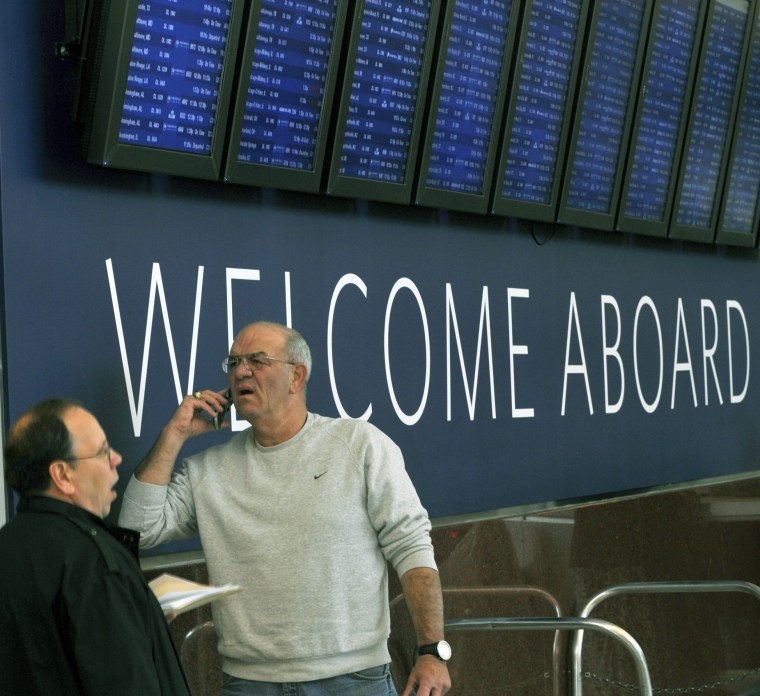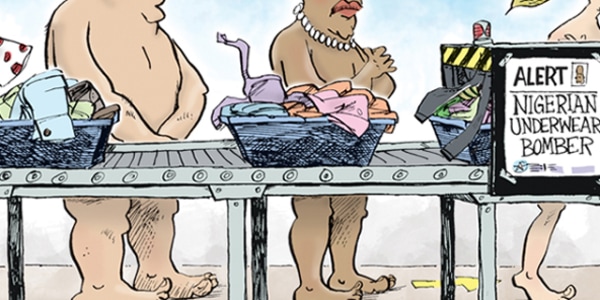So the airline lost your luggage. Should you make a federal case out of it — literally?
Each year, passengers file thousands of complaints about airlines with the federal government. If you're hoping to change the airline's behavior, take this route — and be very patient.
But if you just want compensation for your loss, travel experts suggest going straight to the source.
George Hobica, founder of the travel Web site Airfarewatchdog.com, says going to the airline "is a more direct route to get their complaints heard."
Jami Counter of TripAdvisor.com says act quickly. But not emotionally.
"Be calm and reasonable, and have a reasonable remedy in mind," Counter says. If your flight is delayed, the airline "might give vouchers for food or lodging" even if that's not required.
And if the airline lost or damaged your bag, don't leave the airport without lodging a complaint, he says. Federal rules require airlines to cover expenses due to lost or delayed baggage up to $3,300 per person on domestic flights.
In 2009, consumers lodged 8,819 complaints with the U.S. Transportation Department about air travel. That was down 17 percent from 2008, when protests topped 10,600. Even accounting for fewer passengers because of a drop in travel, it was a notable improvement.
Many travel experts, however, think the government's numbers vastly undercount passenger discontent. The airlines claim to receive more complaints directly. Minneapolis-based travel blogger Terry Trippler says the government figures are the best available measure of customer satisfaction, but they have limits.
"It's like unemployment," Trippler says. "How many people are unemployed, and how many just gave up looking? It could be some people aren't bothering (to complain to DOT) anymore."
People who think complaining to the government will be futile might be missing an opportunity.
Airlines value their standing in the government's monthly report card of complaints and on-time performance, called the Air Travel Consumer Report. Just a few extra complaints could move an airline down a notch or two in the rankings.
Airline officials say they review complaints to the government and usually contact the passenger. Occasionally the carriers make changes when customers ding them repeatedly.
Delta, at the bottom of the rankings, says it's investing in better bag-handling systems and deploying customer-service agents at airports.
"We have to be more consistent in giving (customers) an enjoyable experience that meets their expectations," says Delta spokesman Anthony Black.
United Airlines, which ranked 18th out of 19 carriers last year, is working harder to explain its fees on checked bags, which generated many of the complaints, says United vice president Barbara Higgins.
US Airways changed the way it compensates customers who are kicked off oversold flights. It now gives them discounts that can be used anytime instead of vouchers that had blackout dates, says Kerry Hester, the airline's vice president of customer service.
Southwest Airlines had the lowest rate of complaints in 2009.
Slideshow 20 photos
Cartoons: Danger in the air
Southwest tells employees to resolve customer complaints quickly before they escalate, says Teresa Laraba, senior vice president of customer services. She says employees are authorized to give customers vouchers of up to $100 and supervisors can be more generous. If a flight is delayed, everyone on the plane could be offered a voucher within 24 hours.
The government began taking consumer complaints about air travel in 1970. Jet travel has since become safer, more affordable, less glamorous and more crowded. But passengers still get ticked off about the same things.
"Flight problems have consistently been the top complaint through all those years," says Norm Strickman, director of the Transportation Department office that logs the complaints. "That can mean delays, cancellations or missed connections."
In 2009, 23 percent of complaints dealt with flights, 18 percent were bag-handling problems, and another 18 percent related to ticketing and boarding.
Sometimes the airlines contest complaints and persuade the DOT not to count them. Higgins, the United official, says this can happen if the airline has already offered the aggrieved customer a refund.
Some travelers think the government's report card on airlines would be more effective if more travelers knew about it.
The complaints "don't get that much exposure for the average Joe," says Andres Kello, who operates a Web site called AirlineComplaints.org.
Kello says 1,700 people have posted complaints on his site, and 283,000 have visited since 2007. He says wronged customers should go public with their dispute and not merely settle with complaining to the airline, which he says will issue "a cookie-cutter response."
"If the airlines are held to greater public scrutiny, the service might improve," he says.

